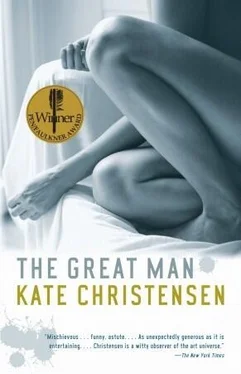It was quarter after one, and Ralph Washington was coming at 1:30. Teddy went back to the kitchen and put the pot of lentil soup on a low flame to warm, then set the table for four. She threw the cheese biscuits together fast, because they tasted better if they were made quickly and lightly, without any fuss about measuring, and put them in the oven, then washed fresh-picked devil’s-ear lettuce. No point in trying to tidy up for Ralph if Henry had withstood this squalor; she wanted to be fair. And although her house was shabby and as neglected in its way as the potting shed, any attention she gave particular corners now would only make the general disheveledness that much more obvious. She lacked the energy to mop or dust or tie old magazines into recycling bundles on a regular basis anymore. Well, an artist’s biographer would presumably expect his subject’s mistress’s house to be unconventional.
When the doorbell made its blat-blat sound, she was just pulling the biscuits out of the oven. She went to open the front door. The black man who stood on her front stoop sported a straw boater hat like a baritone in a barbershop quartet in the Roaring Twenties. He had on gold-rimmed glasses, black jeans, and a short-sleeved white button-down shirt. He carried a canvas shoulder bag so full, it bulged. His skin shone with blackness and a fine sheen of sweat.
“May I help you?” she said, cursing herself for not looking through the peephole first before opening the door. These fanatics came around sometimes. Oscar used to encourage them, argue with them, lead them on, but those days were over.
“I’m Ralph Washington,” he said. His cheeks were high and apple like.
“Of course you are,” Teddy said, flustered. “Come in.”
“Thank you,” he said, and stepped over the threshold. “You must be the famous Claire St. Cloud.”
“Famous? I hardly think so.”
“That’s the province of the biographer,” he said. “History, in other words, makes people, not vice versa.”
“Quite a sense of purpose you’ve got,” she replied. So mistaking him for a Jehovah’s Witness hadn’t been entirely her own fault.
“You could call it that,” he said without smiling.
She gestured toward the sofa, for lack of anything better to do with him. He perched on the sofa and removed his hat, revealing a set of short, neat dreadlocks sprouting from his head like a multitude of little horns.
“May I?” he asked, placing his hat on the ottoman in front of him.
“By all means,” she said with a deep foreboding at his courtly manners and overarticulated speech. She felt a disinclination to sit across from him in the cramped little living room. It was much too hot to keep up with this politeness much longer.
“I’ve been looking forward to meeting you for many years, Miss St. Cloud,” Ralph said.
“Oh, call me Claire, please,” she said. “The girls aren’t here yet, but we can go ahead without them; they both said they weren’t sure when they’d get here. Lunch is almost ready.”
“Of course,” he said, his face alight with an obvious desire to do and say the proper things.
“Why don’t you have a seat at the table,” she said. “Might as well get this show on the road. I have to do a few things, so please help yourself to wine and antipasti and make yourself at home in the meantime.”
She went back to the kitchen, stirred the soup again, arranged the biscuits on a board, dressed and tossed the salad, filled the water glasses.
“Now,” she said, going back into the dining room with a tray, “I imagine you’d like to get right down to business.”
Ralph looked startled. He held an olive in midair. He looked at it as if he were trying to decide whether to put it back or eat it. He kept it suspended there and said, “We don’t need to get to work right away, Miss—”
“Claire,” she repeated, sitting down across from him. “So where would you like to begin?”
Ralph hesitated a moment, then set the olive on his appetizer plate and reached over and switched on the small tape recorder he had set on the table in front of him. “Well, one thing I’d really be interested to hear you talk about,” Ralph said, “is where Oscar felt his work fit into the grand scheme. He wasn’t friends with de Kooning, Guston, Pollock; he wasn’t a joiner; he didn’t fraternize. Do you think his insistence on the figurative, his obsession with the human form, his refusal to capitulate to the prevailing passion for abstraction, allowed him an independence at the same time as it isolated him? Which is not to say he was entirely isolated; look at Lucien Freud, John Currin…. They’re his artistic offspring, wouldn’t you say? His figurative, if you’ll pardon the pun, children.”
“Are you taping this?”
“Do you mind?”
“Oscar always said,” she told him, dishing out some soup into a bowl, “that Lucien Freud was a pompous, overrated no-talent without a smidgen of technical skill, and that his people all looked like badly made meat dolls. John Currin, he found a sensationalistic fool, a cold void. He hated Currin’s women so much, he said he wanted to slash his canvases. This was, of course, when Oscar was an old man. But when he was younger, he was neither isolated nor independent; he always had plenty of people around him who believed in what he was doing. As for those ‘New York boys,’ as he called them, as if he didn’t live here himself, he felt he didn’t need them. Abstract Expressionism was a wet dream, embarrassing to look at, he always said: grown men spurting like virgin boys in their sleep. Guston, at least, had the sense to switch to those dreary little cartoons. Guston was the only one he had any respect for; we met him a few times, had dinner with him and his wife, Musa, once in the city, visited their place in Woodstock another time. I don’t think Guston liked Oscar’s work too terribly much, although they got on well enough, but Oscar respected Guston’s later work. He liked the smoking kidney-shaped heads very much.”
“Well, I know he hated Pollock,” said Ralph.
“Pollock,” said Teddy, smiling at Ralph’s obvious anticipation of Oscar’s reproduced diatribe. “Oscar almost had a stroke if anyone started praising Pollock. He thought Pollock was a retarded child who dribbled all over himself, who had no control of his bodily functions, all spray and spurt, like a bad dog.”
Ralph laughed almost ferally, showing a lot of white teeth. He wasn’t bad-looking really, although he wasn’t her type. There was something a little moist about him; her impression of him as wet-lipped on the phone hadn’t been too far off the mark. She wondered what steely depths of driven egomania undergirded his studious eagerness, the ghosts from the past he had to shove to the back of his mind as he got on with his mission.
She splayed one hand on the table and moved it up and down so it resembled a tarantula, the gesture Oscar had made when he was worked up. “The female figure was the only real subject as far as Oscar was concerned,” she told Ralph. “Cheese and oysters and bottles of beer were all very well if you were a medieval Dutchman and they were imbued with morality and social context. Landscapes had their power, their beauty, of course they did. But the female body was the most beautiful thing on earth, the most powerful and mysterious of all subjects and objects, animate or inanimate, the most familiar, the most earthly, and the most sacred. He used to chant it: “‘mother, queen, goddess, bitch, whore, saint, virgin, milkmaid.’”
Teddy drank some wine, tried a bite of a cheese biscuit. She had bought the cheap cheddar at the C-Town, where she bought all her cheese now. She missed the exciting, expensive cheeses she’d hand-selected every week from her favorite Manhattan shop before her commute home on the subway, with its big cut wheels, its tangy smells of milk fat and good mold. But these biscuits weren’t bad at all.
Читать дальше












